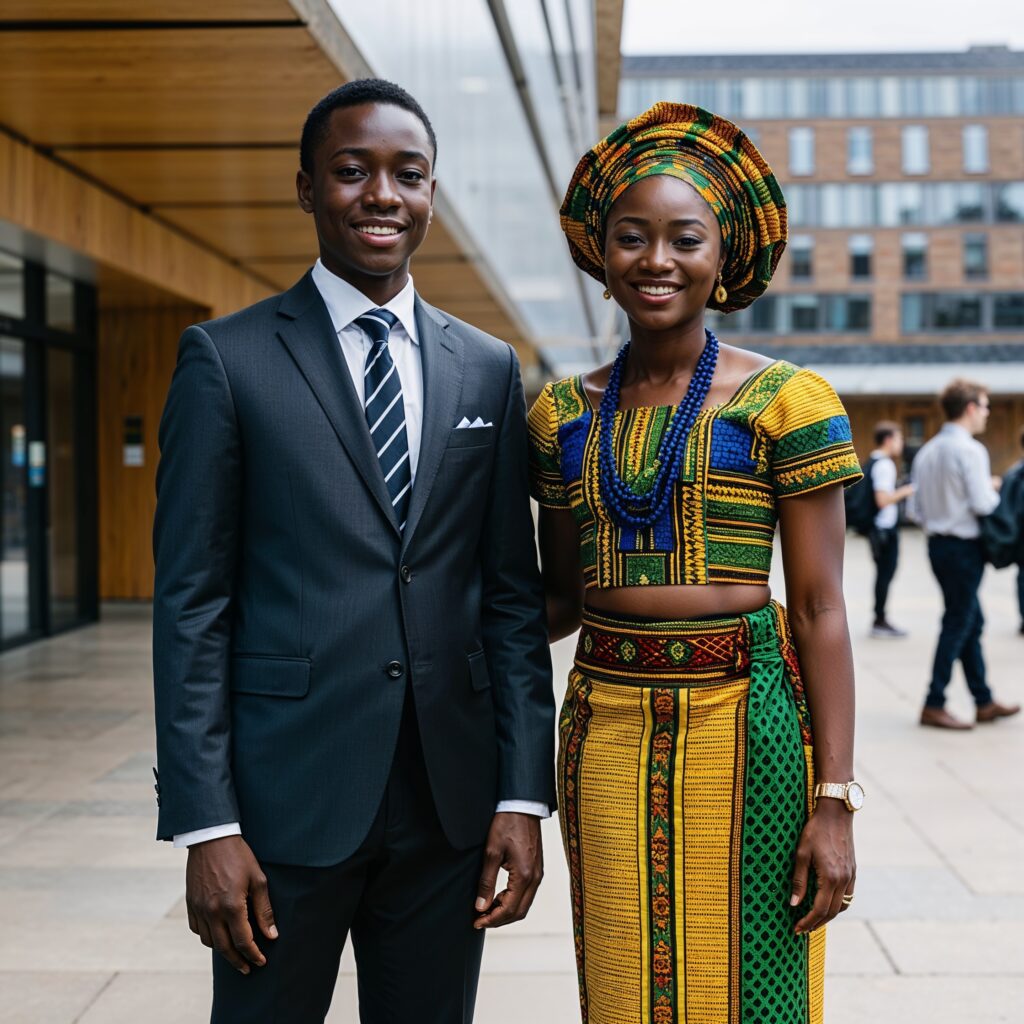When Kuda Met Amaka: A Zimbabwean-Nigerian Love Story in the UK and the Family Conflict that Followed

Kuda and Amaka: A fictional tale of love, cultural differences, and family expectations in the UK.
Kuda had always been a hard-working, focused young man. Born and raised in Harare, Zimbabwe, he’d always been mindful of his family’s expectations. His parents, staunch believers in preserving their Shona heritage, had worked tirelessly to ensure Kuda had the best education possible. So, when he was accepted into a prestigious university in the UK, it felt like the culmination of all their efforts, and they were immensely proud of him.
In his second year at university, Kuda’s life took an unexpected turn. This was when he met Amaka.
The Meeting
It was a sunny afternoon on campus, and Kuda was leaving the library after a long day of studying. As he strolled through the campus, his eyes landed on a girl standing by the university’s café, looking somewhat lost. She was striking—her braided hair falling gracefully over her shoulders, her vibrant Nigerian outfit standing out amid the sea of hoodies and jeans.
Kuda approached her with a warm smile. “Hey, you look a bit lost. Need help finding something?”
Amaka looked up, a slight smile forming on her lips. “Yeah, I’m trying to find the international students’ office.”
As it turned out, Amaka, a Nigerian student, had just transferred to the university. Kuda, being the ever-helpful person he was, walked her to the office and even offered to show her around campus afterward. What began as a simple act of kindness blossomed into a deep connection. They started spending more time together, sharing meals, studying late into the night, and laughing at the small differences in their Zimbabwean and Nigerian cultures.
It wasn’t long before Kuda realized he had fallen for Amaka. She was smart, ambitious, and had a way of making him feel completely at ease. Amaka, too, felt a deep connection with Kuda, appreciating his kind heart and the way he embraced life in a foreign country.

The Conflict
But not everyone was as happy about this budding relationship as Kuda and Amaka were.
Back home in Zimbabwe, Kuda’s parents had always spoken about the importance of marrying within their Shona culture. His mother, especially, had dreams of Kuda bringing home a Zimbabwean bride, someone who understood their traditions, spoke their language, and could continue the family’s customs. Kuda knew this, but for the first time in his life, he questioned whether his parents’ expectations should dictate his future.
A few months into their relationship, Kuda decided to tell his parents about Amaka. He had been avoiding the conversation, knowing how difficult it might be. However, he felt it was time they knew, especially as things with Amaka were becoming more serious.
That evening, Kuda sat at his desk, staring at his phone. He knew the conversation wouldn’t be easy. After what felt like an eternity, he dialed his mother’s number.
“Hello, Mhamha?” Kuda’s voice was steady but nervous.
“Kuda! How are you, my son?” His mother’s voice was warm, as it always was when they spoke.
“I’m good, Mhamha. I wanted to tell you something.”
“Oh? What is it?” she asked, her tone curious.
Kuda took a deep breath. “I’ve met someone here. Her name is Amaka, and she’s Nigerian.”
There was a long pause. Then came the words Kuda had feared.
“A Nigerian girl? Kuda, we raised you to marry a Shona woman. What will people say? What about our traditions?”
His mother’s voice, once warm, now carried an unmistakable tone of disappointment. Kuda tried to explain, telling her how much he cared for Amaka, how they shared the same values, and how she embraced many aspects of Zimbabwean culture. But his mother was firm.
“Kuda, our family has always married within our people. It’s about keeping our heritage alive. Your father will not be happy.”
Navigating the Divide
The days that followed were filled with tension. Kuda’s parents began calling him more frequently, urging him to rethink his relationship with Amaka. They reminded him of his responsibilities to the family and how important it was to marry a Zimbabwean woman. Each conversation left Kuda feeling torn—between the love he had for Amaka and the loyalty he felt toward his family.
Amaka noticed the strain. “Kuda, I don’t want to come between you and your family. If this is too much—”
“No,” Kuda interrupted. “I love you, Amaka. This is just something I need to work through.”
For the first time in his life, Kuda began to truly wrestle with the concept of personal choice versus family expectations. In Zimbabwe, family and tradition held enormous weight. Marriage wasn’t just about love—it was about uniting families, maintaining culture, and preserving values. Yet, in the UK, Kuda had experienced a different perspective. He had come to realize that love wasn’t bound by ethnicity or tradition; it was about mutual respect, understanding, and shared dreams.
Finding Balance
As months passed, the conflict didn’t magically disappear, but Kuda and his parents slowly began to find a middle ground. His parents remained resistant to the idea of him marrying outside their cultural group, but they also saw how serious Kuda was about Amaka. Over time, they agreed to meet her.
When Amaka visited Zimbabwe with Kuda for the first time, she made an effort to embrace the family’s traditions. She wore a simple Zimbabwean outfit, greeted Kuda’s parents with respect, and even spoke a few words in Shona. Though there were still underlying tensions, Kuda’s parents began to see that Amaka shared the values they held dear—respect for family, hard work, and a deep connection to African roots.
For Kuda, this was a turning point. He realized that bridging the gap between his personal choice and his parents’ cultural expectations wasn’t about choosing one over the other—it was about finding a balance. By respecting both his love for Amaka and his family’s traditions, he was slowly navigating a path that allowed for both to coexist.
Conclusion
Kuda’s story is not unique. Many Zimbabweans in the UK face the delicate challenge of balancing their personal desires with the weight of family expectations. For Kuda, the journey was one of self-discovery, learning that love and tradition don’t have to be at odds, but can, with patience and understanding, find harmony. Through open communication, respect for both cultures, and the willingness to meet halfway, Kuda and Amaka’s relationship became a bridge between two worlds—one that honored both Zimbabwean and Nigerian traditions in a land far from home.






